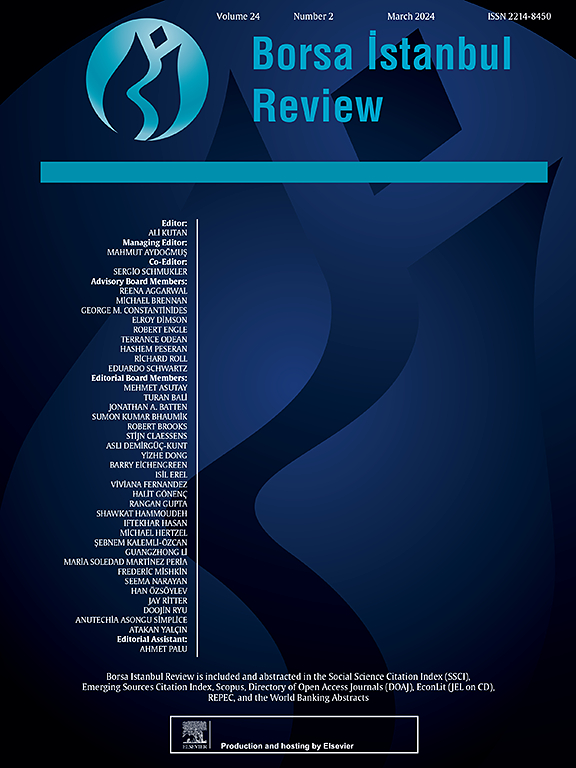Impact of FinTech on capital allocation: Empirical evidence from Jordan and Palestine
IF 7.1
2区 经济学
Q1 BUSINESS, FINANCE
引用次数: 0
Abstract
The explosive growth of financial technology (Fintech) has transformed the credit and equity markets, providing small businesses with unprecedented access to capital and driving financial inclusion. However, how this financial inclusion affects the effectiveness of capital allocation remains unclear. Addressing this question, this study examines the impact of Fintech on capital allocation efficiency using data on Fintech firms from Jordan and Palestine between 2010 and 2020. Our central hypothesis is that while Fintech promotes financial inclusion, it may simultaneously lead to capital allocation inefficiencies. To measure the presence of Fintech, we use the number of Fintech firms in Jordan and Palestine. We find a striking pattern: the expansion of Fintech firms is associated reduce resource allocation to more efficient firms, suggesting systemic inefficiencies. Both the industry and corporate levels exhibit this trend. Mechanisms analysis reveals that this effect is driven by increased competition in the lending market and efficient stock swaps. Overall, we highlight how changes induced by Fintech in debt financing are the main cause of these inefficiencies. Our findings offer implications and insights for policymakers and Fintech companies by stressing the dual impacts of Fintech on financial markets in Jordan and Palestine. This underlines the necessity for a balanced approach to integrating Fintech innovations to ensure that the benefits of enhanced financial inclusion do not compromise financial efficiency and capital allocation. This study significantly contributes to the literature by delivering a comprehensive analysis of the intricate dynamics between Fintech, financial inclusion, and capital allocation efficiency in Jordan and Palestine.
金融科技对资本配置的影响:来自约旦和巴勒斯坦的经验证据
金融科技(Fintech)的爆炸式增长改变了信贷和股票市场,为小企业提供了前所未有的融资渠道,推动了金融包容性。然而,这种普惠金融如何影响资本配置的有效性仍不清楚。为了解决这个问题,本研究利用2010年至2020年约旦和巴勒斯坦金融科技公司的数据,考察了金融科技对资本配置效率的影响。我们的中心假设是,虽然金融科技促进了金融普惠,但它可能同时导致资本配置效率低下。为了衡量金融科技的存在,我们使用了约旦和巴勒斯坦的金融科技公司数量。我们发现了一个惊人的模式:金融科技公司的扩张与减少资源分配给效率更高的公司有关,这表明系统效率低下。行业和企业层面都表现出这种趋势。机制分析表明,这种效应是由借贷市场竞争加剧和有效的股票互换驱动的。总体而言,我们强调金融科技在债务融资中引发的变化是这些低效率的主要原因。我们的研究结果通过强调金融科技对约旦和巴勒斯坦金融市场的双重影响,为政策制定者和金融科技公司提供了启示和见解。这凸显了采取平衡方法整合金融科技创新的必要性,以确保增强普惠金融的好处不会损害金融效率和资本配置。本研究通过全面分析约旦和巴勒斯坦金融科技、普惠金融和资本配置效率之间错综复杂的动态关系,对文献做出了重大贡献。
本文章由计算机程序翻译,如有差异,请以英文原文为准。
求助全文
约1分钟内获得全文
求助全文
来源期刊

Borsa Istanbul Review
Multiple-
CiteScore
7.60
自引率
3.80%
发文量
130
审稿时长
26 days
期刊介绍:
Peer Review under the responsibility of Borsa İstanbul Anonim Sirketi. Borsa İstanbul Review provides a scholarly platform for empirical financial studies including but not limited to financial markets and institutions, financial economics, investor behavior, financial centers and market structures, corporate finance, recent economic and financial trends. Micro and macro data applications and comparative studies are welcome. Country coverage includes advanced, emerging and developing economies. In particular, we would like to publish empirical papers with significant policy implications and encourage submissions in the following areas: Research Topics: • Investments and Portfolio Management • Behavioral Finance • Financial Markets and Institutions • Market Microstructure • Islamic Finance • Financial Risk Management • Valuation • Capital Markets Governance • Financial Regulations
 求助内容:
求助内容: 应助结果提醒方式:
应助结果提醒方式:


